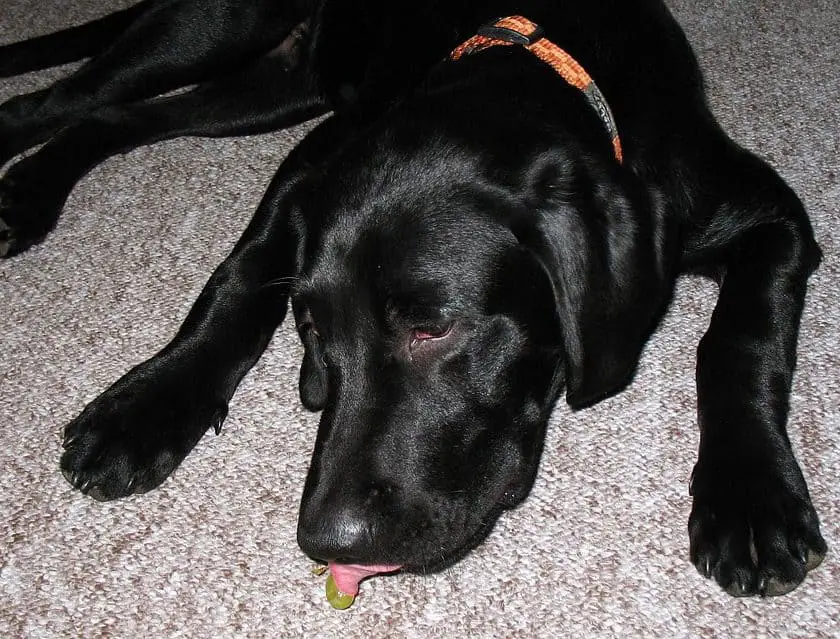These are the reasons why you should never give your dog grapes! Read more to see the list of other deadly fruits and nuts!
As we dog lovers know, many dogs will eat almost anything, but that does not mean that anything they will gulp down is good for them, even if it looks like it fits in a healthy food group for an animal.
Although some fruits are actually great snacks for your beloved dog, you need to be very careful with which fruits you let them eat.
Some fruits can be downright deadly for your faithful friend!
Table of Contents
What fruits are bad for dogs?
Dogs should never be given grapes, raisins, figs, avocados, and macadamia nuts.
Although scientists have not yet identified the substance in these foods that cause some dogs to get sick, these fruit and nuts have all been known to cause sudden, life-threatening illnesses to some dogs, resulting in some of them tragically dying.
What can grapes do to my dog?
Grapes contain an unknown ingredient that can be toxic to some dogs and cause them to suffer irreparable kidney damage, and in some cases, terminal kidney failure.
Grapes can cause a dog’s kidneys to stop filtering waste properly, which can cause a lethal build-up of toxins in their bloodstream, leading to the complete shut-down of their kidneys, resulting in a difficult death.

The number of grapes or raisins that can hurt a dog can vary by a dog’s weight.
As raisins are dried grapes, they have a higher concentration of toxicity than grapes, with fewer of them being able to cause sickness in your dog; therefore, raisins should be considered even more harmful than fresh grapes avoided at all costs.
Dangerous doses begin at about 1 or 2 grapes for a 10-pound dog, and 3 or 4 grapes for a 20-pound dog.
Although some dogs may not suffer any reaction to eating grapes and raisins, until more information is known about the toxic substance in them, it is best to avoid feeding all types of grapes and raisins to dogs.
What illnesses can macadamia nuts and avocadoes cause my dog?
Macadamia nuts can cause weakness, depression, vomiting, tremors, and hyperthermia in dogs.
Avocados are a risk as they can cause gastrointestinal irritation and figs have been known to cause skin problems.
Spotting Symptoms of Fruit or Nut Poisoning
If your pet has consumed any of the above foods listed above as dangerous, and is exhibiting any of the symptoms below; please seek immediate advice from a licensed vet.
- Vomiting
- Diarrhea
- Loss of appetite
- Lethargy and weakness
- Abdominal pain
- Dehydration
- Difficulty urinating or passing only a small amount
- Inability to pass urine
- Foul-smelling breath
- Ulcers in the mouth
- Tremors
- Seizures
- Coma
What should I do if my dog has eaten any of these foods?
If your dog eats any of the foods listed above, you should immediately seek medical attention for them.
Contact your vet or an animal health care provider as a matter of emergency.
It may be suggested that vomiting is induced in your dog, to regurgitate the consumed toxins.
This treatment is only recommended if the dangerous food was eaten within two hours, as the window of time is still small enough for the food to have not been completely digested by your dog.
Your vet will likely recommend a series of blood and urine tests to determine the level of toxicity in your pet’s body, and to find out if any kidney damage has occurred.
Sadly, some dogs may have suffered such acute kidney damage they are unable to recover; and in such cases it is likely a vet may recommend euthanasia as the kindest, least painful option.
Simple ways to keep your dog safe
Preventing such terrible things happening to your fabulous, furry friend is quite simple: Never let them eat grapes and the other foods listed above!
Keep all these foods in closed, lidded containers, stored away in high cupboards or in a fridge; far out of reach of your pooch.
This goes for all things that contain traces of these foods too.
Be careful that you dispose of any of these foods in a sensible way, wrapping them completely in a sealed bag, before putting them into the trash.
Do not allow your dog to nose through garbage in public places too, as you never know what may have been thrown into it.
Are there fruits and nuts my dog CAN eat safely?
- Apples (without their core or seeds)
- Bananas (in moderation)
- Blueberries
- Oranges (without rind or seeds)
- Pears
- Cranberries
- Raspberries
- Strawberries
- Watermelon (without seeds or rind)
- Peaches and Plums (but their stones are dangerous, and must be removed first)
All these fruits are great for your dog to snack on and contain a lot of things that contribute to a healthy lifestyle.
Apples, for example, are high in fiber and an excellent source of vitamin C, whilst blueberries are an antioxidant and provide zinc and iron.
Bananas are seen as a healthy treat for your dog thanks to their potassium content, among other things, but their high sugar levels mean they should be given sparingly.
It is very important to remove cores, seeds, stones, and rinds before giving your dog any fruit as they can be very harmful.
Stones are a choking hazard, and seeds are especially dangerous as they contain amygdalin; which is a form of poison commonly known as cyanide.
Ensure you pay special attention to remove and discard all of these safely before feeding your pet any of these healthy and safe fruit snacks.
Recommended Reading:
Can Dogs Eat Mint? Is It Really Safe For Dogs?
How To Make Crunchy Homemade Vegetarian Carrot Dog Biscuits
Easy Homemade Hypoallergenic Dog Treats Recipe for Dogs with Allergies

